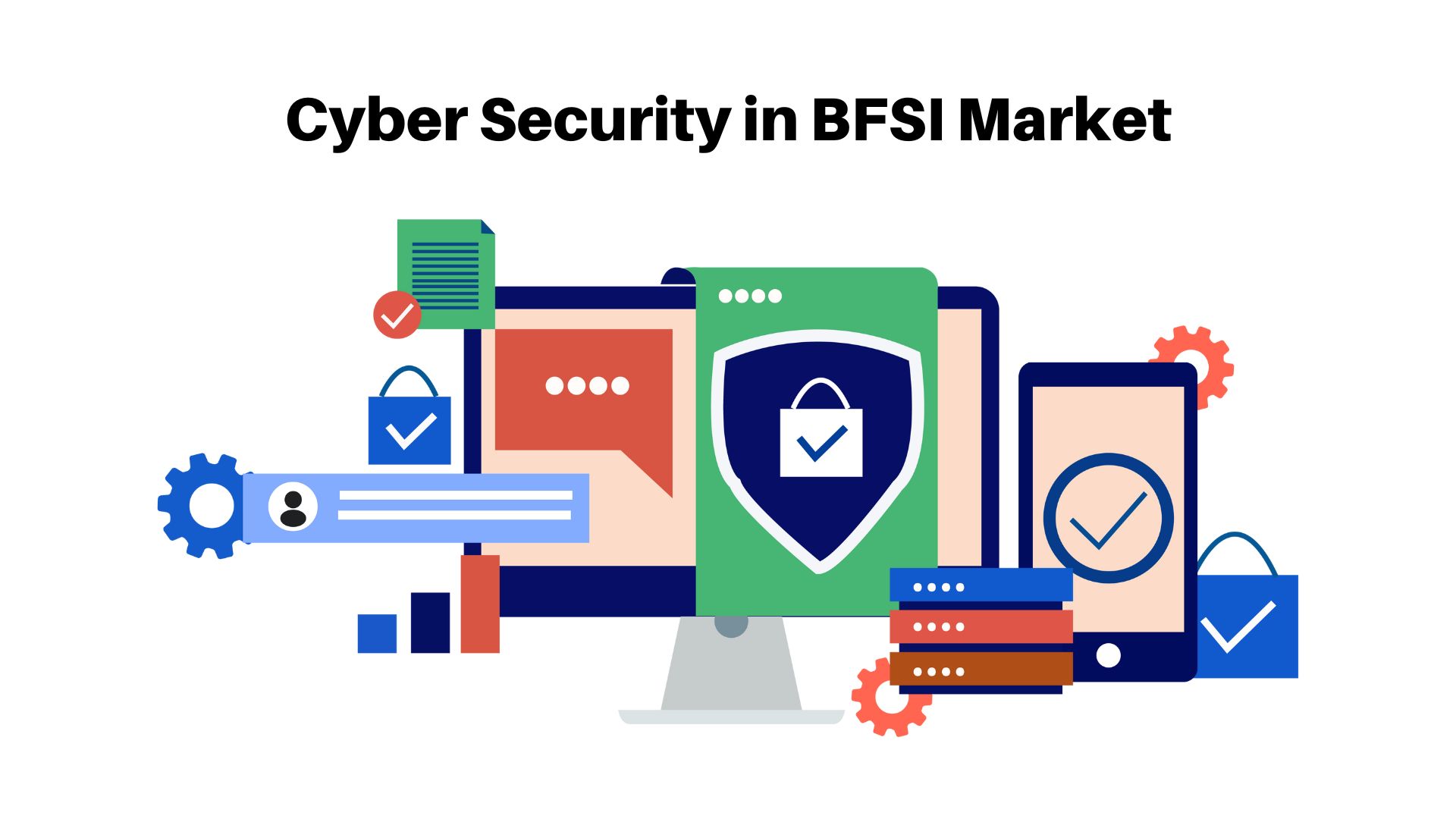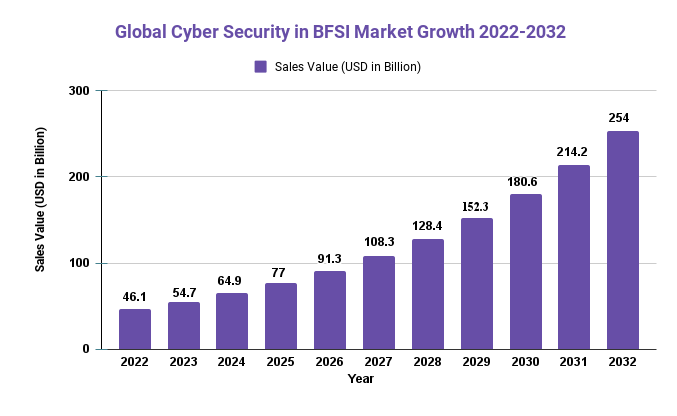Cyber Security in BFSI Market Size (USD 254 billion by 2032) with 18.6% CAGR

Page Contents
Cyber Security in BFSI Market Overview
The Banking, Financial Services, and Insurance (BFSI) sector is a crucial pillar of any economy and has become increasingly vulnerable to cybercriminals due to the digitization of financial transactions. Cyber security in the BFSI market refers to measures taken to safeguard financial institutions from various cyber threats like hacking, phishing, malware, ransomware attacks, and other attacks.
In recent years, the BFSI sector has invested heavily in cybersecurity due to the potentially devastating financial losses, reputation damage, and loss of customer trust that a successful cyber attack can cause. Forecasts indicate that this market will grow at an annual compound growth rate (CAGR) between 2021 and 2026 due to factors such as an increasing number of cyber threats, the need for regulatory compliance, and the increasing adoption of cloud-based security solutions.
The global cyber security in BFSI market size is forecast to reach USD 254 billion by 2032 from USD 46.1 billion in 2022, rising at a compound annual growth rate (CAGR) of 18.6% during the forecast period.
The cybersecurity market for BFSI is divided into distinct segments based on solutions, services, deployment modes, organization sizes, and regions. Key solutions offered in the space include identity & access management, risk & compliance management, encryption, data loss prevention, firewall protection as well as antivirus/anti-malware software protection. On a service level, the sector offers consulting, integration & implementation, and managed services.
Geographically, North America is expected to lead the cybersecurity in the BFSI market, followed by Europe and Asia Pacific. Major players operating within this space include IBM Corporation, Cisco Systems, Symantec Corporation, Check Point Software Technologies, McAfee LLC, and Palo Alto Networks among others.
In conclusion, the cybersecurity in BFSI market is rapidly growing due to an ever-increasing need for security in the financial sector. The demand for this service will only continue increasing over time as threats become more sophisticated and financial institutions continue investing in cybersecurity measures to safeguard their assets and customers.

Key Takeaways
- Cybersecurity in BFSI refers to measures taken to protect financial institutions from cyber threats such as hacking, phishing, malware, and other attacks.
- The global cybersecurity in the BFSI market is expected to grow at a compound annual growth rate (CAGR) of around 18.6% between 2022 and 2032.
- Key drivers of the market include increasing cyber threats, regulatory compliance, and the growing adoption of cloud-based security solutions.
- The market is segmented by solutions, services, deployment modes, organization sizes, and regions.
- Key solutions offered in the market include identity and access management, risk and compliance management, encryption, data loss prevention, firewall, and antivirus/anti-malware.
- North America is expected to dominate the market for cybersecurity in BFSI, followed by Europe and Asia Pacific.
- Major players in the market include IBM Corporation, Cisco Systems, Symantec Corporation, Check Point Software Technologies, McAfee, LLC, and Palo Alto Networks, among others.
- Cybersecurity in BFSI is critical to protecting financial institutions from devastating financial losses, reputation damage, and loss of customer trust.
Request For Sample Report: https://market.us/report/cyber-security-in-bfsi-market/request-sample/
Regional Snapshot for Cyber Security in BFSI Market
- The global cybersecurity in the BFSI market can be broadly divided into regions such as North America, Europe, Asia Pacific, Latin America, and the Middle East and Africa.
- North America is expected to dominate the market due to the high level of digitalization in the region, with the United States as a major contributor. The rising adoption of cloud-based security solutions, stringent regulatory compliance requirements, and demand for advanced threat intelligence and analytics solutions are some key factors driving growth within this region.
- Europe is expected to experience tremendous growth in the cybersecurity market for BFSI, due to the increasing adoption of digital technologies within financial services, rising cyber threats, and the need to comply with data protection regulations such as GDPR. Over the forecast period, Europe is expected to witness impressive expansion rates.
- The Asia Pacific region is expected to experience significant growth in cybersecurity in the BFSI market due to the increasing adoption of digital technologies within financial services, rising cybersecurity threats, and regulatory compliance demands. Countries such as China, India, Japan, and South Korea are predicted to contribute significantly towards this regional expansion of this market.
- Latin America and the Middle East/Africa are expected to experience significant growth in the cybersecurity in BFSI market due to the increasing adoption of digital technologies and evolving threat landscapes in these regions. However, these regions are still early in development, so growth there will be slower than in other regions over the forecast period.
Drivers
- Financial Institutions Face Growing Cyber Threats: Financial institutions are prime targets for cybercriminals due to the sensitive financial information they handle. With the increasing digitization of transactions, cyber threats such as hacking, phishing, malware, and ransomware have become more sophisticated, increasing the demand for advanced cybersecurity solutions.
- Regulatory Compliant: Financial institutions must abide by various regulations and standards related to data privacy and cybersecurity, such as GDPR, PCI-DSS, and SOX. This has necessitated the development of cybersecurity solutions that can assist these financial institutions in meeting these regulatory demands.
- Growing Adoption of Digital Technologies: As financial institutions embrace new digital tools such as mobile banking, online payments, and cloud-based services, their attack surface for cybercriminals has grown considerably larger. Thus, cybersecurity remains an urgent concern for them.
- Cloud-based security solutions are becoming more and more popular: Cloud-based security solutions offer several advantages, such as scalability, cost efficiency, and adaptability – which has seen an uptick in adoption within the Business to Business (BFSI) sector.
- Advanced Threat Intelligence and Analytics Solutions: Financial institutions require sophisticated threat intelligence and analytics solutions to detect, respond to, and prevent cyber attacks in real time. This necessitated the need for solutions such as SIEMs, threat intelligence systems, and security analytics programs.
Restraints
- High Implementation Costs: Adopting advanced cybersecurity solutions can be expensive for financial institutions, particularly small and medium-sized enterprises (SMEs), which may have limited budgets for cybersecurity investments.
- Lack of Qualified Cybersecurity Professionals: For financial institutions, the shortage of skilled cybersecurity professionals presents a major obstacle. This may prevent financial institutions from adopting advanced security solutions due to a lack of in-house expertise required to manage them effectively.
- The complexity of Cybersecurity Solutions: Advanced cybersecurity solutions can be complex and require specialized management. This could present a challenge for financial institutions that do not have dedicated IT teams or the expertise to manage them effectively.
- Slow Adoption of New Technologies: Financial institutions may take a while to adopt new technologies due to concerns about compatibility, data security, and regulatory compliance. This could impede the uptake of advanced cybersecurity solutions.
- Lack of Awareness: Small and medium-sized enterprises (SMEs) may lack awareness regarding the criticality of cybersecurity and the potential risks posed by cyber-attacks. This can hinder the uptake of security solutions within this segment of the market.
Opportunities
- Emerging Technologies: Advancements such as artificial intelligence (AI), machine learning (ML), and blockchain present significant cybersecurity prospects for BFSI companies. These tools can be employed to bolster financial transaction security, detect and respond to cyber threats in real time, and enhance overall cybersecurity.
- Increased Adoption of Cloud-based Security Solutions: Cloud-based security solutions are becoming increasingly popular within the business-to-business (BFSI) sector due to their scalability, adaptability, and cost-effectiveness. This presents cloud security solution providers with an immense opportunity to grow their market share.
- Growing Demand for Managed Security Services: The complexity of cybersecurity solutions and a shortage of skilled cybersecurity professionals are driving demand for managed security services. This presents opportunities for providers of these solutions to expand their offerings within the Business Financial Services (BFSI) sector.
- Enhancing Partnerships and Collaborations: Financial institutions are increasingly joining forces with cybersecurity solution providers to bolster their security capabilities. This presents cybersecurity solution providers with an opportunity to collaborate and grow their customer base alongside financial institutions.
- Regulators Are Paying Close Attention to Cybersecurity: Regulators are placing more emphasis on cybersecurity in the BFSI sector, with several regulations and standards related to data privacy and cybersecurity. This presents opportunities for cybersecurity solution providers to offer compliance solutions to financial institutions.
Challenges
- Evolving Cyber Threats: Cyber threats are constantly improving and becoming more sophisticated, posing a significant challenge to cybersecurity solution providers. Financial institutions must be ready to address emerging risks and adjust their solutions accordingly.
- Compliance with Regulations: For financial institutions, adhering to cybersecurity and data privacy regulations presents a major obstacle. These requirements are constantly changing, so they must make sure their cybersecurity solutions adhere to the most up-to-date rules.
- Lack of Standardization: Lack of standardization in the cybersecurity industry can pose a challenge for financial institutions, making it difficult to compare and assess different cybersecurity solutions.
- Integration with Legacy Systems: Financial institutions often have legacy systems that may not be compatible with modern cybersecurity solutions. Integrating cybersecurity measures into these legacy platforms can present a major challenge.
- Lack of Awareness and Training: Lacking awareness and training among employees can present a major challenge for financial institutions. Cybersecurity solutions are only effective if they're used correctly, so financial institutions must invest in employee development to guarantee their cybersecurity solutions are utilized efficiently.
Grow your profit margin with Market.us Get this Report
Recent Developments
- Increased Focus on Cloud-Based Security Solutions: Financial institutions are turning towards cloud-based security solutions due to their scalability, adaptability, and cost efficiency. As a result, cybersecurity solution providers have begun investing more heavily in these cloud-based security solutions.
- Growing Demand for Managed Security Services: The increasing complexity of cybersecurity solutions and lack of skilled cybersecurity professionals are driving demand for managed security services within the business-to-business (BFSI) sector. This has resulted in increased investment by cybersecurity solution providers in these services.
- The emergence of AI and Machine Learning-based Cybersecurity Solutions: AI and machine learning-based cybersecurity solutions have become increasingly popular in the BFSI sector due to their capacity for detecting and responding to cyber threats in real time, prompting increased investment by cybersecurity solution providers into these types of solutions.
- Data Privacy Gaining Relevance: The increasing importance of data privacy has spurred demand for cybersecurity solutions that can safeguard sensitive information. As a result, security solution providers have begun investing more heavily in data privacy solutions.
- Increased Partnerships and Collaborations: Financial institutions are increasingly joining forces with cybersecurity solution providers to bolster their security capabilities. This has resulted in an uptick in investments by these security solution providers into partnerships and collaborations.
Key Market Segments in Cyber Security in BFSI Market
Type
- On-Premises
- Cloud-Based
- Hybrid Models
Application
- Banking
- Insurance Companies
- Other Financial Institutions
Key Market Players
- Trend Micro
- Symantec Corporation
- CSC Computer Sciences Limited
- BAE Systems
- Booz Allen Hamilton
- IBM Corporation
- The 41st Parameter
- FireEye
- Check Point Software Technologies
- Skybox Security
Nature Insights
- Focus on Risk Management: Financial institutions must manage a variety of risks, including cyber ones, to safeguard their assets and maintain customer confidence. Cybersecurity solutions that offer comprehensive risk management capabilities are in high demand in the BFSI market.
- Real-Time Threat Detection and Response Needed: Financial institutions require real-time threat detection and response capabilities in order to prevent and mitigate cyber-attacks. Cybersecurity solutions that utilize advanced technologies like AI and machine learning in real-time to detect and address threats are becoming increasingly popular within the BFSI market.
- Compliance with Regulations: For financial institutions, compliance with cybersecurity and data privacy regulations is of utmost importance. Therefore, cybersecurity solutions that offer compliance capabilities are in high demand within the BFSI market.
- Focus on Data Security: Financial institutions possess vast amounts of sensitive customer data that must be safeguarded from cyber threats. Cybersecurity solutions with advanced data protection capabilities are in high demand in the BFSI market.
- Integration with Existing Systems: Financial institutions often have complex IT environments, necessitating cybersecurity solutions that can easily integrate with existing systems in order to be effective. Therefore, cybersecurity solutions offering ease of integration are in high demand in the BFSI market.
Report Scope
| Report Attribute | Details |
| The market size value in 2022 | USD 46.1 Bn |
| Revenue forecast by 2032 | USD 254 Bn |
| Growth Rate | CAGR Of 18.6% |
| Regions Covered | North America, Europe, Asia Pacific, Latin America, and Middle East & Africa, and Rest of the World |
| Historical Years | 2017-2022 |
| Base Year | 2022 |
| Estimated Year | 2023 |
| Short-Term Projection Year | 2028 |
| Long-Term Projected Year | 2032 |
Frequently Asked Questions
Q: What is the cybersecurity in BFSI market?
A: This refers to a market for cybersecurity solutions and services tailored specifically for banking, financial services, and insurance (BFSI) institutions. These measures are taken in order to protect financial institutions from cyber threats that could cause financial losses, data breaches, and reputational harm.
Q: What are some key drivers of cybersecurity in the BFSI market?
A: Some major drivers for cybersecurity in this space include an increase in the frequency and sophistication of cyber attacks, increased awareness among financial institutions about the need for security measures, as well as tightening government regulations related to data privacy protection and cybersecurity measures.
Q: What are some key opportunities in the cybersecurity space within BFSI?
A: Some key prospects in this market include increasing adoption of cloud-based security solutions, rising demand for managed security services, and emerging AI- and machine learning-based cybersecurity options.
Q: What are some of the major challenges in the cybersecurity space within BFSI?
A: Some major obstacles facing this market include evolving cyber threats, noncompliance with regulations, lack of standardization within the industry, integration with legacy systems, and lack of awareness/training among employees.
Q: What are some recent developments in the cybersecurity space within BFSI?
A: Recently, there has been an increased focus on cloud-based security solutions, increasing demand for managed security services, advancements in AI/machine learning-based cybersecurity tools, increasing importance placed on data privacy protection measures, as well as more partnerships between financial institutions and security solution providers.
The team behind market.us, marketresearch.biz, market.biz and more. Our purpose is to keep our customers ahead of the game with regard to the markets. They may fluctuate up or down, but we will help you to stay ahead of the curve in these market fluctuations. Our consistent growth and ability to deliver in-depth analyses and market insight has engaged genuine market players. They have faith in us to offer the data and information they require to make balanced and decisive marketing decisions.



